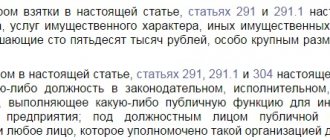Fraud (Article 159 of the Criminal Code) is considered as the illegal appropriation of property belonging to other people. This crime may also involve acquiring rights to someone's valuables through breach of trust or deception. Much attention is paid to Part 3 of Art. 159 of the Criminal Code of the Russian Federation. Fraud involving the use of official authority or on a large scale poses a particular threat to society. Let's look at this part in more detail.
Art. 159, part 3: sentences
A culprit who has used his official position in a crime or has committed an act on a large scale may be fined. Its value is determined by calculating the salary or other profit of the subject for 1-3 years. A fixed amount can be set from 100 to 500 thousand rubles. This sanction is the mildest punishment under the given circumstances. Art. 159, part 3 also involves forced labor. Their duration is up to 5 years. This sentence is part 3 of Art. 159 of the Criminal Code of the Russian Federation may be accompanied by an additional restriction in the freedom of the offender for up to 2 years. The article also provides for imprisonment of the subject. Its duration is up to 6 years. In Art. 159, Part 3 of the Criminal Code of the Russian Federation, punishment in the form of imprisonment may be supplemented by restriction of freedom or a fine. The size of the latter is up to 10 thousand rubles. or equal to the income/salary of the culprit for the month. Restriction of freedom under Art. 159, Part 3 of the Criminal Code of the Russian Federation - punishment, the duration of which in this case is no more than one and a half years.
Composition of the crime and punishment
- recovery in the amount of one hundred thousand to five hundred thousand rubles;
- forced labor for up to 5 years;
- imprisonment for up to 6 years.
The punishment under this article of the Criminal Code of the Russian Federation depends on the composition of the offense.
Illicit enrichment
For illegal enrichment, the following methods of punishment are provided:
- fine;
- various types of work;
- detention.
The amount of recovery, the period of work and arrest depend on the severity of the crime.
Extra large size
Today, large-scale fraud is recognized as the theft of money or property worth more than 250,000 rubles. If the damage to a citizen or enterprise is estimated at 1,000,000 rubles, then the act is regulated as theft on an especially large scale.
With this type of fraud, criminals face:
Amendments for loan debt
The Criminal Code of the Russian Federation provides for a statute of limitations for loan-related scams. If within three years the borrower has not made a single attempt to pay off the debt obligations, and the creditor has not gone to court, the debt is written off. In this case, the citizen who took out the loan can himself apply to the court with a request to close the loan.
Grounds for liability
The subject of the act specified in Art. 159, part 3 of the Criminal Code, specific. According to general principles, sane individuals over the age of 16 are held accountable. As for the part under consideration, the subject may be a person who holds a certain post. Large size is another sign that makes it possible to apply Art. 159, part 3. The commentary to the norm indicates that the amount of damage in value (monetary) terms should not be more than a million rubles, but not less than 250 thousand. If the amount of harm falls outside the specified framework, other parts of the article under consideration are used.
Arbitrage practice
Despite the fact that articles on lending fraud have appeared recently, there is already judicial practice regarding this act.
For example, a citizen overestimated his income level and provided the bank with incorrect information, as a result of which he received a loan. The defendant did not repay the loan; as a result, the bank filed a claim in court. After considering the case, the judge imposed a fine and repayment of debt obligations on the defendant.
Conclusion
- Fraud, according to the Criminal Code, is the appropriation of property belonging to another person, or the right to own someone else’s property, obtained by deception.
- Responsibility for the crime is specified in Art. 159 of the Criminal Code of the Russian Federation.
- Part 3 Art. 159 of the Criminal Code of the Russian Federation is supplemented by the condition that a citizen commits a violation of the law using official powers, and also by the fact that theft occurs on a large scale.
- Article 159.1 of the Criminal Code of the Russian Federation regulates scams in the field of loans.
- For violation of the law, the Criminal Code of the Russian Federation provides for several types of punishment - monetary penalties, compulsory labor and imprisonment.
Part 3, art. 159 of the Criminal Code of the Russian Federation: comments
Criminal prosecution of persons who have committed criminal acts begins at the moment of initiation of proceedings on the identified facts or when they are brought in as suspects or accused. These statuses have certain features that allow them to be distinguished. In particular, a suspect is a citizen against whom a case has been initiated or who has received notification of his suspicion of an act considered in Art. 159, part 3. A person becomes accused after the relevant decision is made. This document describes this status.
Preventive measure
If a citizen is suspected or accused of a crime specified in Art. 159, part 3, the investigator/interrogator can choose any option from Art. 98 Code of Criminal Procedure. As a rule, in relation to such persons a measure is taken in the form of:
- Signs not to leave.
- Arrest (domestic).
- Collateral.
- Detention.
- Personal guarantee.
The decision to take a citizen into custody, apply a measure in the form of bail or house arrest is made exclusively in court. Taking a subscription or personal guarantee is carried out during preliminary work by authorized persons (inquirer/investigator).
Severity and mitigation of sanctions
A less severe punishment may be established based on the provisions of Article 64 of the Criminal Code. This provision provides that the body authorized to hear the case has the opportunity to apply milder sanctions or not to use additional coercive measures. Such decisions may be determined by the presence of factors relating to the motives and goals of the act, the direct role of the subject in the crime, and the nature of his behavior when committing illegal actions. Other circumstances that significantly reduce the level of public threat can also influence the mitigation of sanctions. More stringent than provided for in Art. 159, part 3 or 4, a measure of coercion can be used in case of a combination of crimes. This means that a person is charged with several charges at the same time. Also, tougher sanctions take place if the person accused of fraud has another outstanding punishment on the date of the trial of the crime.
Defense against fraud charges is our specialty!
If you, your friend or relative are suspected or accused of fraud, or a pre-investigation check is being carried out against you for fraud, we advise you to immediately contact a lawyer at Trial Lawyer, and you will be provided with a specialist who has extensive experience in defending this category of cases.
Our work standards that we are proud of:
- lawyers are ready to visit the Principal 24/7, since urgent legal assistance in cases of fraud may be required, including on weekends and holidays;
- our lawyers have many years of successful experience in defending business representatives suspected/accused of fraud;
- we are ready to intervene in a fraud case at any stage, even in difficult situations;
- possibility of monthly payment for a lawyer’s services;
- we provide complete anonymity and confidentiality;
- the long-term impeccable reputation of our lawyers, for which we vouch.
Call at any time - a fraud lawyer is ready to provide timely assistance!
Confiscation of property
According to the provision of norm 104.1 of the code, this procedure does not provide for the seizure in favor of the state, in accordance with the verdict, of money, material assets, property that were acquired by the perpetrator as a result of a criminal act in the form of fraud. This right is established by Article 1064 of the Civil Code. According to its provisions, the harm caused by the subject to the victim must be fully compensated. The culprit shall compensate for the damage accordingly. The court, upon the application of the prosecutor, the victim, the plaintiff (civil), or their representatives, may adopt a decision on the use of measures aimed at ensuring compensation for damage resulting from the crime. This right is granted by Art. 230 Code of Criminal Procedure. The executors of this judicial act are FSSP employees. The decree, therefore, can seize any property owned by the person guilty of unlawful acts.
Common Questions
What to do if fraudsters received your card details and debited the money?
If fraudsters were somehow able to gain access to the card and debited funds from it, then the victim should:
- Contact the bank and block the card.
- Write a statement at the bank office stating that the specified operation was not carried out by the victim.
- Write a statement to the police about the theft of funds from the card.
What should I do if they call from the bank and ask for card details and access code?
Under no circumstances disclose your card details to anyone, as well as the CVC code located on the back of the card. Bank representatives know who the card is registered to and see the client’s information.
Fraudsters also use SMS messages with a message that the card is blocked. The client calls back to the specified number, and the scammers report that there was a failure on the server and ask for the card number and PIN code that was sent to the victim’s phone. Once this information is shared, scammers can control the victim's account.
What is phishing?
Phishing is the theft of card data by creating mirror sites. That is, scammers create a mirror site exactly like the original. The difference may be one letter of the domain name. Next, the client enters personal data, pays for the purchase and is left without a service and without money. As a rule, scammers fake the websites of airlines, insurance companies and banks themselves.
If you have logged into online banking and have not received an SMS about logging in, we recommend that you immediately contact the bank and block your account. You can unblock it by contacting the bank with your passport and a mandatory password change.
Sources: Resolution of the Plenum of the Supreme Court of the Russian Federation dated November 30, 2017 No. 48
You can find more complete information on the topic in ConsultantPlus. Free trial access to the system for 2 days.
Persons authorized to investigate
Cases initiated based on identified facts of fraud fall under the category of alternative jurisdiction. Preliminary measures fall within the competence of investigators/interrogators of the Ministry of Internal Affairs and other law enforcement agencies that identified the crime. The investigation of acts falling under parts three, two and four of the article under consideration is carried out by employees of the investigative departments of the Department of Internal Affairs of the Russian Federation. As a rule, the duration of preliminary measures is within 2-6 months. If there are several episodes in progress or if several persons are suspected of a crime, the investigation may drag on for several years.
Circumstances to be established
In the process of preliminary activities, employees performing investigative work or inquiry in the framework of a fraud case identify and confirm facts that must be proven according to the Code of Criminal Procedure. Such circumstances include:
- The events of the illegal act specified in the considered part of the commented article.
- The circumstances in which the crime was committed.
- Guilt of the citizen in the act charged to him. In particular, we are talking about the presence of a criminal element in his behavioral acts.
- The amount and nature of the harm suffered by the victim as a result of the unlawful act.
- Factors that exclude crime and punishable behavior.
- Circumstances on the basis of which exemption from liability is possible.
- Mitigating and aggravating factors.
Fraud schemes with plastic cards: when transferring money to a card, through a mobile bank
If we talk about fraud with plastic cards in its everyday concept, then the methods of fraud with bank cards are very diverse. For example:
- fraud when transferring money to a card - the criminal deceives the card number and CVV code - supposedly to transfer payment or to return an erroneous transfer, and, accordingly, gets the opportunity to pay with someone else’s card on the Internet;
- fraud with bank cards through a mobile bank - the fraudster begins to connect the mobile bank to someone else’s card from his device, and obtains the connection code from the cardholder who received the SMS; this allows the fraudster to quickly withdraw funds from all accounts of the cardholder or obtain a credit card and use it;
- by adding a special device to ATMs (real or fake) that reads card data; this type has its own name - skimming (based on the data received, a fake payment card is made, with which money is withdrawn from the account);
- by installing overlays on ATMs that capture the card, or a “Lebanese loop” (special devices or just a piece of hard film that prevent the card from getting into the ATM; fraudsters spy on the PIN code and, after waiting for the victim to go to the bank, take out the card and withdraw it from it money).
Banks and law enforcement agencies are not without success in combating the listed crimes, so their prevalence in Russia is constantly changing depending on factors such as banks strengthening the protection of cards and ATMs and the technical development of fraudsters in response.
Whether the bank is obliged to return money when it is written off from a bank card or via Internet banking without the client’s consent, find out in ConsultantPlus. If you do not have access to the K+ system, get a trial demo access for free.
Evidence base
As part of preliminary investigative measures, authorized employees collect materials that will serve as a substantiation of their position in recognizing the guilt of the suspects. Typically the evidence is:
- Testimony directly from the citizen involved in the proceedings as an accused or suspect.
- Conclusions and explanations of experts.
- Evidence.
- Testimony of a victim of fraudulent activities. If the victim is a legal entity, then an explanation is given by a representative from the organization.
- Conclusions and explanations of specialists.
- Protocols recording investigative activities and other documents of evidentiary value.
The stage of preliminary activities ends when the collected materials are sent to the prosecutor. He, in turn, approves the indictment (conclusion).
Case trial
Materials collected in relation to persons who committed acts under Part 1, with an indictment, are sent according to the jurisdiction of the first instance to the magistrate. Cases of crimes, which are indicated in parts three, four and two of the article under consideration, are dealt with by district (regional) authorized bodies. During the meeting, all materials and evidence collected at the stage of preliminary investigative work are subject to direct study. As an exception, the legislation allows cases in which a court decision is made in a special procedure for criminal proceedings. The decision on further procedural actions against the accused must be based on the evidence that was studied during the hearing. During the trial, the judge hears the testimony of the defendants, victims, and witnesses. Experts also give testimony during the meeting. The judge reads out protocols and other documents and performs other actions aimed at examining the materials provided.
Cost of a lawyer in cases of fraud
| Name of service | Price |
At the pre-investigation stage | |
| Consultation | from 5,000 rub. up to 10,000 rub. |
| Filing a statement about committing a crime | from 10,000 rub. |
| Legal assistance at the verification stage from | from 60,000 rub. |
| Participation in giving an explanation (survey) | from 25,000 rub. |
At the pre-investigation stage | |
| Protection at the investigation stage | from 250,000 rubles (or from 75,000 rubles per month) |
| Defense at the inquiry stage | from 150,000 rubles (or from 59,000 rubles per month) |
| Representing the interests of the victim | from 120,000 rubles (or from 59,000 rubles per month) |
At the stage of judicial consideration of a criminal case for fraud | |
| Defense of the defendant | from 150,000 rub. |
| Representing the interests of the victim | from 100,000 rub. |
Important point
Proceedings in court are carried out exclusively in relation to the accused. In this case, materials are considered only on the charges brought against the citizen. Changing the prosecutor's act is allowed in exceptional cases. Moreover, such actions should not lead to a worsening of the position of the perpetrator. The change may not violate the defendant's rights to defense. These rules mean that certain adjustments to the charges can only be made in the direction of mitigation.
Solution
Based on the results of the trial, research of the evidence base, and hearings from the participants in the trial, the trial judge has the right to approve an acquittal or indictment. During the decision-making process, the authorized person must answer mandatory questions. They sound like this:
- Has it been proven that the incriminated act was actually committed?
- Has it been established that it was the accused who participated in the fraud?
- Is the act recognized as a crime?
- Which exact paragraph of Part 3 of the article in question covers imputed illegal behavior?
- Has the defendant been proven guilty of committing fraud?
- Are the sanctions established by the relevant part of the article subject to application against a citizen?
- Have circumstances been identified conducive to a tougher or softer punishment?
It should be noted, however, that in the proceedings under the article in question, the authorized person quite often, upon initial examination of the evidence obtained, establishes its futility. In this regard, recently judges have been returning such materials back to the prosecutor. In such cases, they are guided by the grounds specified in Article 237 (part one) of the Criminal Code. Thus, the collected materials are not even considered due to the inconsistency of the evidence. Despite this, in practice there are quite a lot of cases in which guilty verdicts were passed against the defendants. However, it is unlikely that it will be possible to avoid liability if the facts are established.





